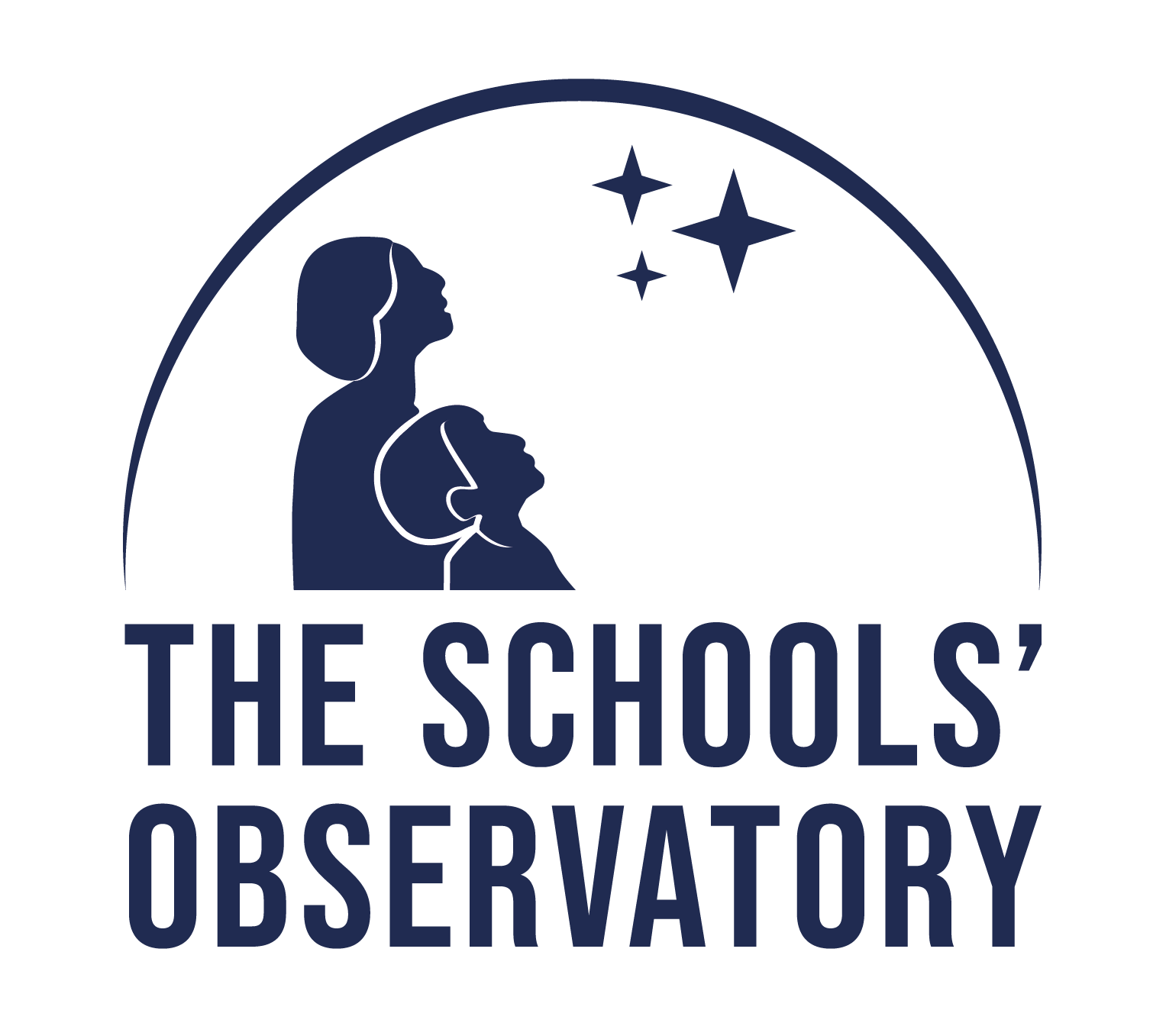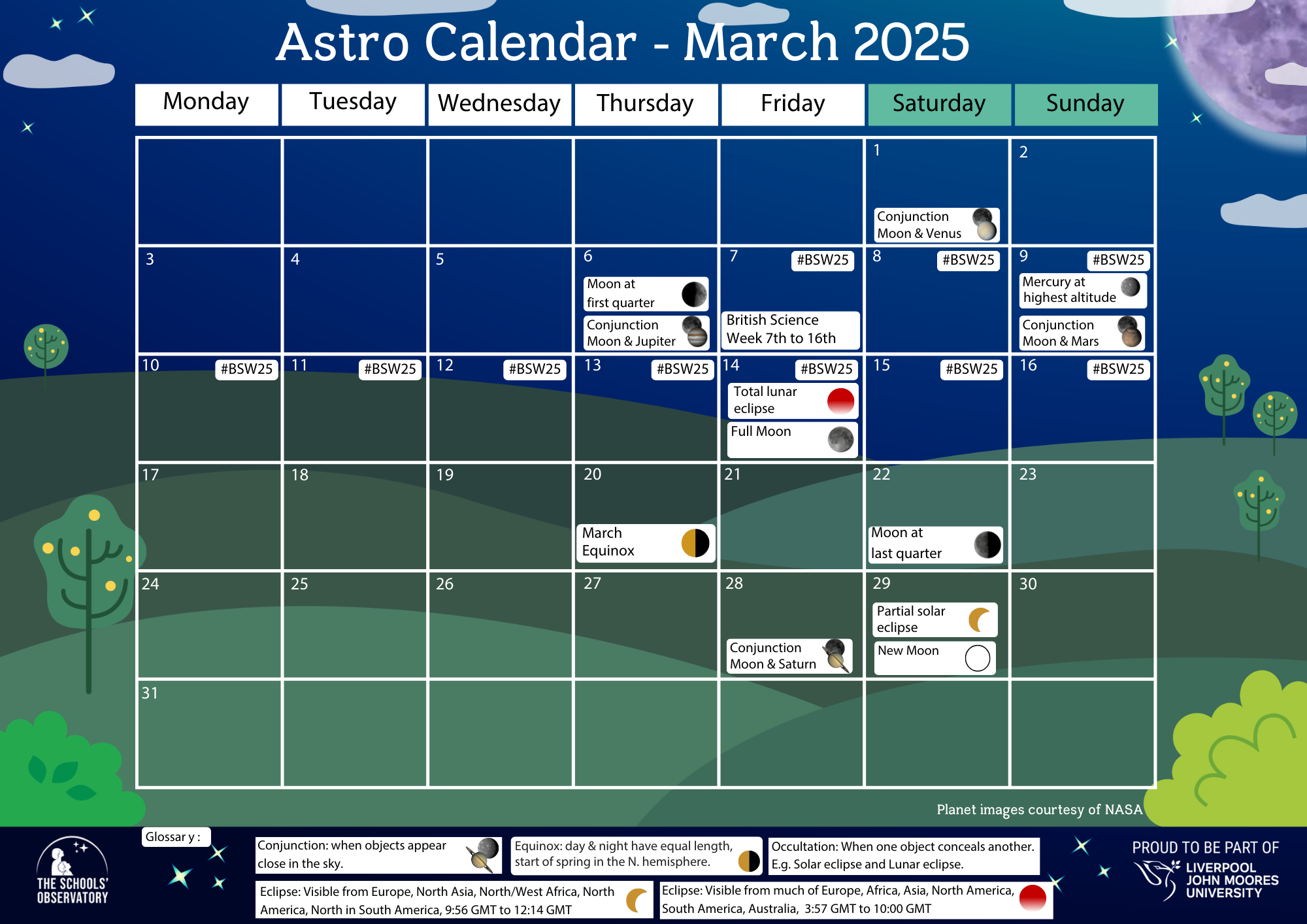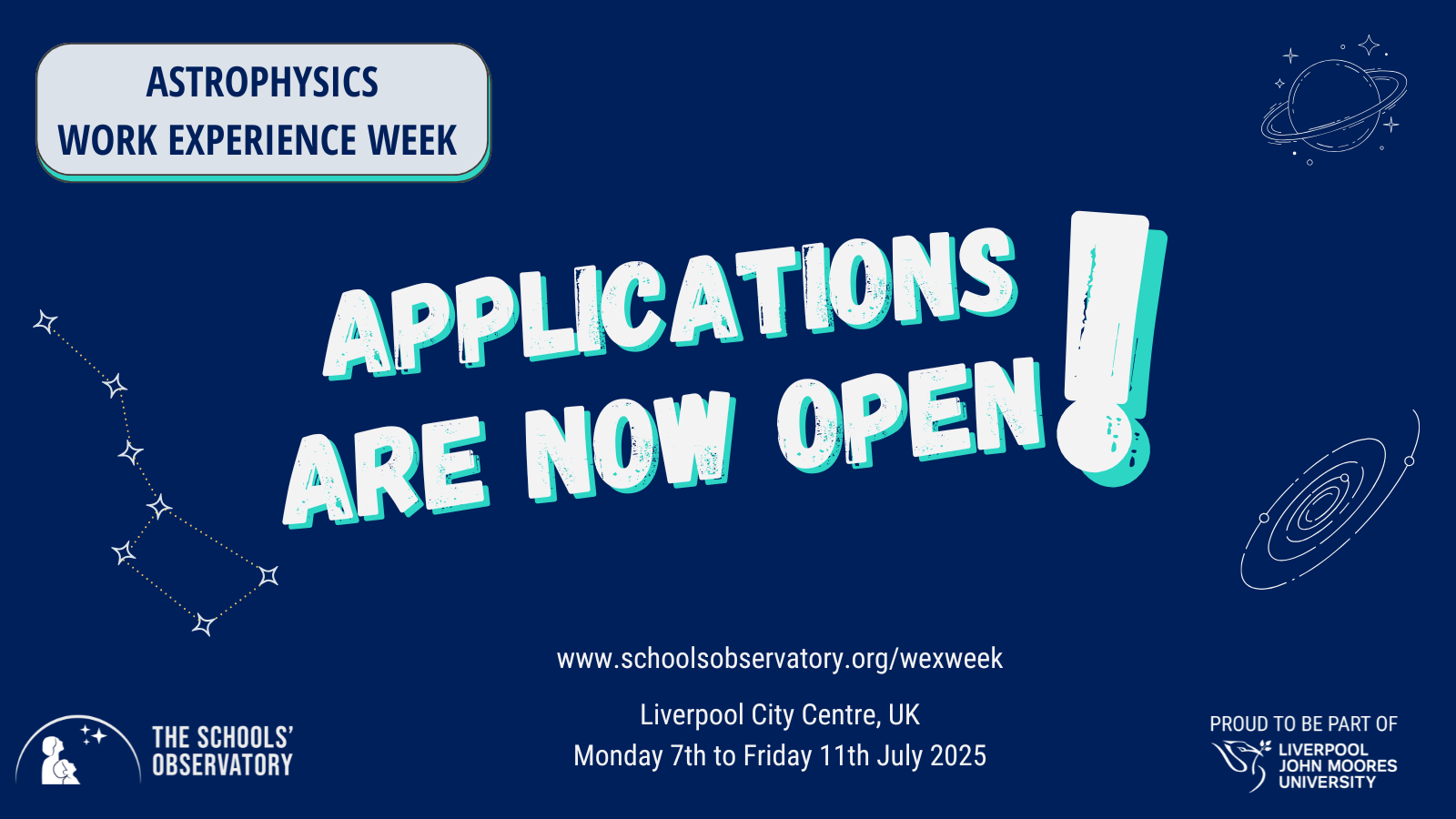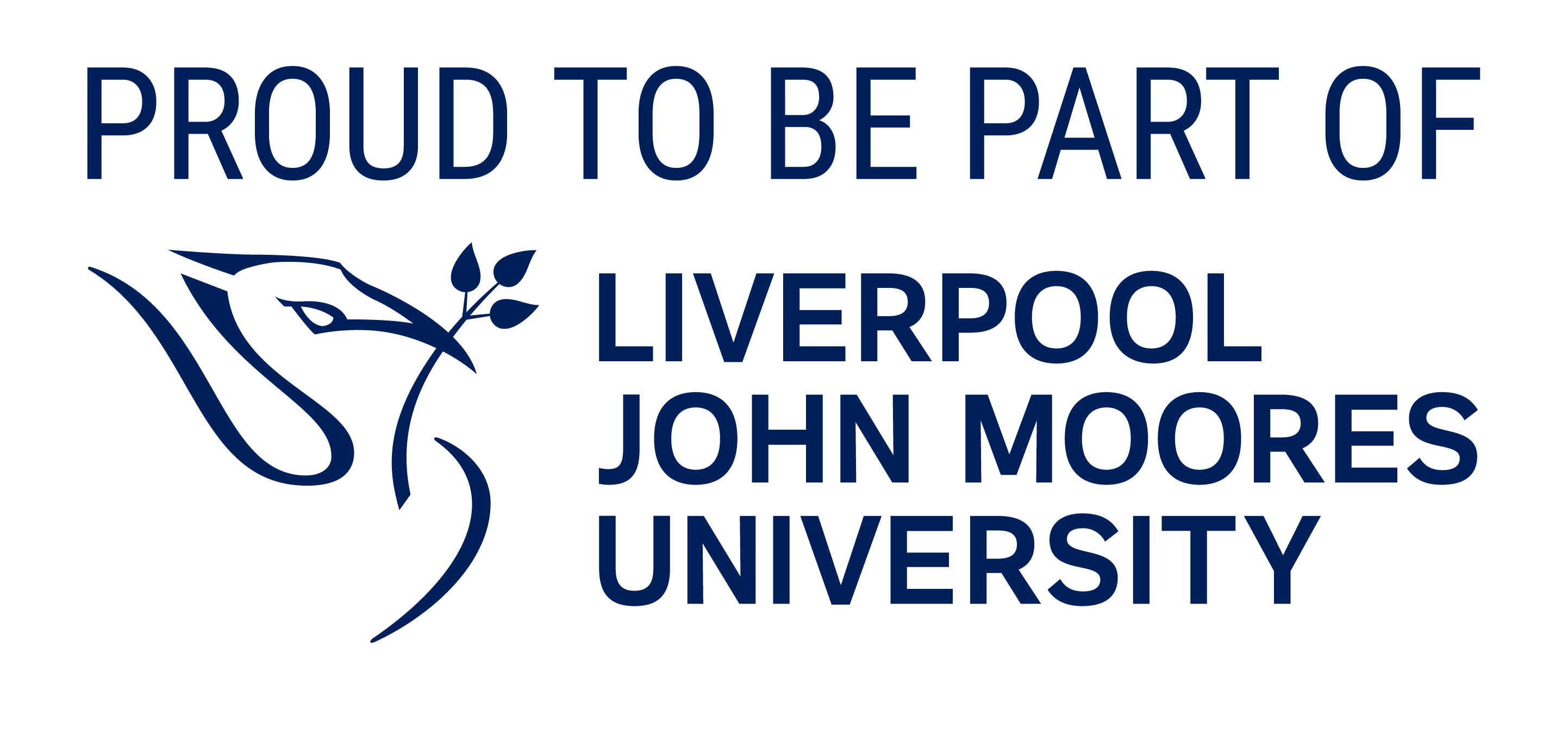
The Schools' Observatory News
March 2025
![]()
International Women's Day
On 8th March, we celebrate International Women’s Day, recognising the achievements of women in all fields, including space science and astronomy! Women have played a crucial role in expanding our understanding of the Universe, overcoming barriers and inspiring future generations to reach for the stars.
Meet some of the incredible women from our Career Heroes:
- Mary Jackson – NASA’s first Black female engineer, who worked on aerodynamics and helped pave the way for more diversity in STEM fields. Her work contributed to key space missions, and she spent her later career advocating for more women in engineering.
- Jocelyn Bell-Burnell – The astrophysicist who discovered pulsars, one of the most important astronomical discoveries of the 20th century. Despite her groundbreaking work, she was initially overlooked for the Nobel Prize, but her contribution to astronomy remains invaluable.
- Samantha Cristoforetti – An ESA astronaut, engineer, and former Italian Air Force pilot. She holds the record for the longest uninterrupted spaceflight by a European astronaut and has conducted vital research aboard the International Space Station.
You can discover more inspiring figures on our Career Heroes page.
Are your students or children curious about careers in space? Let them explore these fun Things To Do activities:
- Space Jobs Game – Discover the many different career paths in the space industry by matching skills and interests to real job roles.
- Space for Everyone Quiz – Challenge stereotypes about who works in space and uncover the diverse range of people making discoveries beyond Earth.
Let us continue to celebrate the women who have shaped space science and inspire the next generation to follow in their footsteps!
.png)
![]()
British Science Week: Change and Adapt!
From 7th–16th March, British Science Week celebrates science and innovation, and this year’s theme is Change and Adapt.
In space, survival depends on adaptation, whether it is life adjusting to extreme environments or planets forming under different conditions. Explore these activities to investigate how life and planets evolve:
- Design a Planet – Create your own exoplanet and decide what conditions are needed to support life.
- What Does Life Need? – Watch this video to explore the key ingredients for life and whether other planets could support it.
- Life on Earth – How are living things connected? What do they need to survive?
Science is all about exploring and adapting to new knowledge, just like the Universe itself.
![]()
International Day of Maths!
On 14th March, the International Day of Mathematics highlights the role of maths in understanding the Universe.
Why not put your students’ skills to the test with some space-themed maths challenges?
- Maths with the Moon – Use real lunar data to solve maths problems linked to the Moon.
- Calculate a Day on Jupiter – Work out how fast Jupiter spins by analysing real images of the gas giant.
Maths is everywhere in astronomy, from measuring distances in space to tracking planetary motion.
![]()
See Space in a New Light for International Colour Day
Every year on 21st March, we celebrate International Colour Day! It is a perfect time to explore how astronomers use false colour imaging to reveal hidden details in space!
Most telescope images are captured in black and white, but there is often more information than the human eye can see. Astronomers use software to apply false colours, enhancing the details in stars, nebulae, and galaxies. This technique helps uncover important data about temperature, composition, and brightness.
You can try this yourself using our AstroLab software! Submit your own observation or explore our image archive to experiment with false colour imaging and uncover new details in real astronomical data.
Create your own false colour images and discover the universe in a whole new way!
![]()
World Poetry Day: A Universe in Words
Space has long inspired poets, just as it has astronomers. The vastness of the cosmos, the birth and death of stars, and the search for our place in the Universe have all been captured through poetry.
On 21st March, as we celebrate World Poetry Day, we invite you to explore the beauty of space through words.
One poet who blended science and art was Rebecca Elson, an astronomer whose poetry reflects on the wonders of the Universe. Here are some of her thought-provoking works:
- The Expanding Universe – A child wonders how we know the universe is expanding, as light stretches across space like waves of water.
- Explaining Relativity – A poetic take on Einstein’s theory, describing space curving gently around planets rather than rigid grids and sharp vectors.
- Let There Always Be Light – A reflection on dark matter, questioning whether the Universe contains enough unseen mass to prevent it from fading into nothingness.
Why not encourage your students or children to write their own space-inspired poems? They could describe the twinkling of distant galaxies, the journey of a spacecraft, or the mystery of black holes.
If your students or children write a poem, we would love to read it! Feel free to drop us an email at SchoolsObs@ljmu.ac.uk.
![]()
Switch Off for Earth Hour - Celebrate Dark Skies!
On 29th March, join millions worldwide in switching off your lights for Earth Hour to raise awareness of climate change and energy conservation.
Light pollution not only dims our view of the stars but also disrupts wildlife and wastes energy. By reducing unnecessary lighting, we can protect natural dark skies, save energy, and enjoy a clearer view of the Universe.
Take this opportunity to step outside, look up, and reflect on the importance of preserving the darkness for both astronomy and the planet.
![]()
Look to the Sky!
Plan your stargazing adventures with our March astronomy calendar! Download it to display at home or in the classroom. Get ready for an exciting month of celestial events, including Mercury at its highest altitude and conjunctions between the Moon and some of the Solar System’s most impressive planets. Don’t miss out on what the night sky has to offer!
Download and display March's astronomy calendar!

![]()
UK and Ireland based: Astrophysics Work Experience Week 2025
The deadline is fast approaching, but the application form is still open and will close on Tuesday, April 22nd 2025. As a reminder, the week is for students in year 12 (or equivalent, in the UK and Ireland) and begins on Monday, 7th July, and ends on Friday, 11th July 2025.
Students from across the UK and Ireland are welcome, but you will need to arrange your own accommodation. We particularly encourage applications from students in the Liverpool City Region.
Key Dates:
- Applications Open: 3rd February 2025
- Applications Close: 22nd April 2025 (12:00 noon)
- Outcome Notification: 6th May 2025
If you have any questions about the application process, email us at SchoolsObs@ljmu.ac.uk during office hours. We look forward to welcoming the next generation of astrophysicists!
Visit our Work Experience Week page for more details and the link to the application form.

![]()

